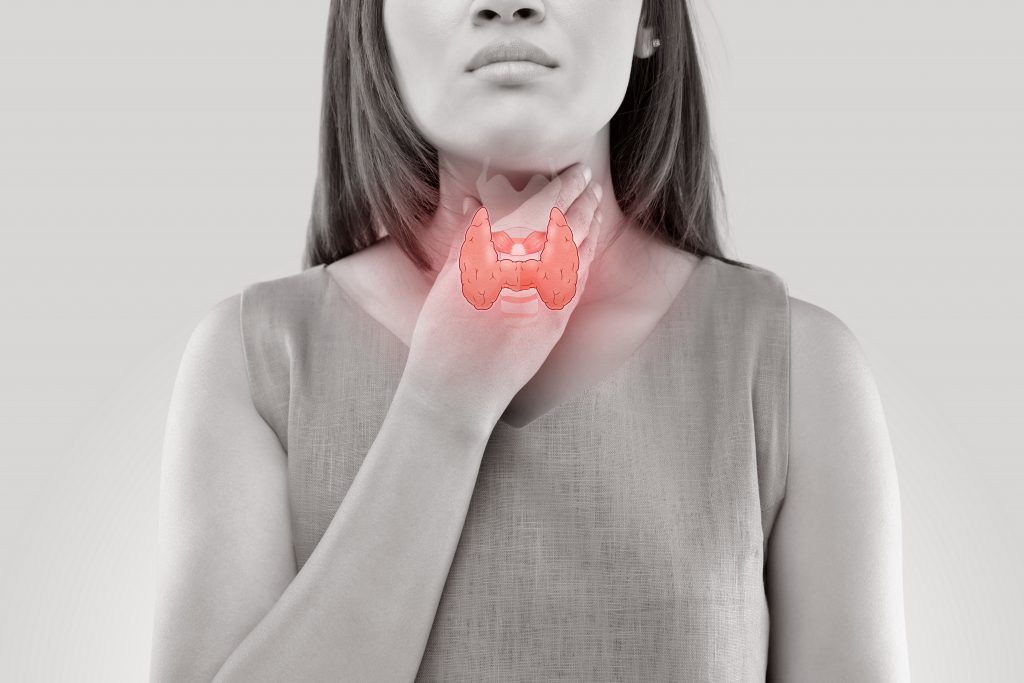September 10, 2021
How to Lose Weight with Hypothyroidism
Unexplained weight gain is a common sign of hypothyroidism, especially if you start gaining weight without making any major changes to your diet or activity level.
Weight gain increases the risk for a wide range of serious health problems, including high blood pressure, diabetes, and heart disease. If you are diagnosed with hypothyroidism, managing your condition and losing excess weight is essential to reducing your risk for related complications and health problems.
Continue reading to learn more about why hypothyroidism can cause weight gain and how to lose weight with hypothyroidism.
What Is Hypothyroidism?
Hypothyroidism occurs when your thyroid gland is unable to produce the levels of hormones your body needs to effectively regulate important metabolic processes. The thyroid gland is a butterfly-shaped gland located at the front of your neck right below the larynx. Brain development, heart function, and digestion are some of the many metabolic processes affected by hypothyroidism.

Kristyn Montgomery, PA-C, a physician assistant with Healthcare Associates of Texas adds, “The most common cause of hypothyroidism in this country is autoimmune thyroiditis (Hashimoto’s). Hypothyroidism is relatively common, especially in women and older people. It is easily treatable with medication usually once diagnosed. However, due to the nature of the vague nonspecific symptoms it can cause, it can easily go undiagnosed if not tested for.”
Symptoms of hypothyroidism tend to develop slowly over time and include fatigue, constipation, high cholesterol, and weight gain. Risk factors for hypothyroidism include being female, being 60 years of age or older, and having a family history of thyroid disease.
Hypothyroidism can often be effectively treated and managed using medications that balance your thyroid hormone levels. A doctor can work closely with you over months or years to ensure your thyroid hormone levels stay at healthy, balanced levels.
Why Does Hypothyroidism Cause Weight Gain?
Thyroid hormones regulate your metabolism and the way your body burns calories. If you have hypothyroidism, your body will produce lower levels of thyroid hormones, which will slow your metabolism and cause you to burn calories at a slower rate. A combination of these factors causes weight gain in hypothyroidism, and it is often more noticeable in those with severe symptoms.
“Most symptoms with hypothyroidism are very vague and easy to blame on something else, like stress for example,” Montgomery explains. “However, one common symptom that makes me think of possible hypothyroidism is if patients complain of weight gain that makes no sense. In other words, if they suddenly quit working out and are eating junk food all day which led to weight gain, then no, their weight gain is not due to hypothyroidism likely because it is explainable by lifestyle changes. If a patient gained weight out of nowhere without changing anything with their diet or exercise habits, it definitely can be due to hypothyroidism and is worth checking out. Other symptoms include excessive fatigue despite sleeping a regular 7-8 hours or more at night, brain fog, generalized hair loss, and cold sensitivity. One of the biggest risk factors is if a patient has a family history of thyroid disease, thyroid cancer, or autoimmune diseases, like Hashimoto’s. Hashimoto’s is when your body attacks its own thyroid gland thinking it’s a foreign invader. This leads to an inflamed, sometimes enlarged thyroid gland. This can then cause hypothyroidism.”
How Much Weight Gain Does Hypothyroidism Cause?
“Thyroid hormones regulate our metabolism. Not enough thyroid hormones available slows our metabolism and results in weight gain,” says Montgomery.
People diagnosed with hypothyroidism can gain between five and 10 pounds or more, based on the severity of their symptoms. According to the American Thyroid Association, most of the extra weight gained due to hypothyroidism is due to excess salt and water accumulation. However, patients usually start to lose this excess weight after they begin treatment.
Does Everyone with Hypothyroidism Gain Weight?
Weight gain is one of many symptoms of hypothyroidism, which means not everyone with this thyroid condition will gain weight.
“Hypothyroidism can cause a wide variety of nonspecific symptoms to different degrees of severity,” Montgomery adds.
However, many other symptoms of hypothyroidism can contribute to weight gain, including constipation, fatigue, muscle weakness, and heavy menstrual periods (which may cause bloating). For example, fatigue and muscle weakness can make you feel too tired and drained to exercise and do other activities that promote weight loss and the burning of calories.
Can Hypothyroidism Medication Cause Weight Gain?
The standard treatment for hypothyroidism is the daily use of a medication called levothyroxine. Levothyroxine is a synthetic thyroid hormone that can boost your levels of this hormone to reduce symptoms of hypothyroidism, including weight gain.
Montgomery explains, “If the Levothyroxine dose is off then it can result in weight gain which is why it‘s important to do regular follow ups with blood work with your doctor. Levothyroxine is ideally taken on an empty stomach by itself (not with other medications) in the morning 1 hour before eating to make sure it gets absorbed properly. A variety of foods and medications/supplements can interact with it and cause it to not work properly.”
Certain foods, supplements, and medicines may prevent levothyroxine from working properly, which may also contribute to weight gain. Iron supplements, calcium supplements, and foods that are high in fiber or soy may interfere with levothyroxine. Ask your doctor about foods and supplements that may prevent levothyroxine from working as it should so you can avoid potential weight gain.
Can You Lose Weight If You Have Hypothyroidism?
It’s completely possible to lose weight if you have hypothyroidism, especially if you stick to your treatment regimen as directed and consult with your doctor regularly about any side effects or continued symptoms of hypothyroidism. If hypothyroidism is the sole root cause of your weight gain, you will start to lose excess weight as soon as your thyroid levels become properly balanced.
How to Lose Weight When You Have Hypothyroidism
You can take several steps to lose weight when you have hypothyroidism.
Montgomery advises, “The key part is for patients with hypothyroidism to keep their thyroid disease stable to set themselves up for the best

success for weight loss. This means following up with their doctor regularly, getting blood work done, and taking medications as prescribed. After that, they should evaluate their lifestyle and make sure they are eating a well-rounded healthy diet and getting regular exercise. If hypothyroidism is uncontrolled, it can cause patients to end up almost working against themselves for weight loss, making it more difficult to lose weight despite proper diet and exercise.”
Additionally, take your medication as prescribed. If you are taking levothyroxine, take your tablet or capsule as directed by your provider.
Evaluate your diet carefully and make healthy changes that can help you lose excess weight. Reduce your intake of alcohol, sweets, and foods high in sodium, as these can contribute to weight gain.
Regular exercise helps boost your metabolism and energy levels. If you’re already exercising, increase the intensity of your workouts or ask a fitness professional about different exercises and activities you can do to lose excess weight.
How Can I Lose Weight with Hypothyroidism and Menopause?
Hypothyroidism can often worsen symptoms of menopause, and the hormone fluctuations experienced during menopause may contribute to or worsen hypothyroidism.
Consult with your doctor right away if you are going through menopause and think you may have thyroid issues or if you have hypothyroidism and are starting to go through menopause. Your doctor may refer you to an endocrinologist who specializes in hormone disorders and can help you manage both conditions with a lower risk of complications.
What Is the Best Exercise for Hypothyroidism?
Any type of exercise or physical activity can help with symptoms of hypothyroidism, as long as it increases your heart rate to the point it boosts your metabolism and helps you burn calories.
“It’s honestly no different than what is recommended for patients without hypothyroidism – cardio combined with strength training,” Montgomery says.
Many doctors recommend a workout routine that includes low-impact aerobics exercises and strength training. Running, hiking, swimming, pushups, and squats are some of the many exercises that can help you stay fit and lose excess weight.
What Foods Are Good for Hypothyroidism?
Certain nutrients are essential for optimal thyroid health and can naturally balance your thyroid hormone levels to reduce symptoms of hypothyroidism.
“Foods that contain iodine, selenium and zinc have been shown to be helpful in patients with hypothyroidism to encourage a healthy thyroid,” Montgomery recommends.
Eggs, seafood, fruits, vegetables, seeds, and unprocessed meats contain high amounts of iodine, zinc, and selenium.
Stay away from soy-based foods, as soy contains compounds called goitrogens that can interfere with your thyroid function and hormone levels. Also, avoid eating highly processed foods, including sausage, hot dogs, cookies, cakes, and frozen meals, as these foods are known to cause weight gain and will not help you lose excess weight related to hypothyroidism.
DISCLAIMER
The information featured in this site is general in nature. The site provides health information designed to complement your personal health management. It does not provide medical advice or health services and is not meant to replace professional advice or imply coverage of specific clinical services or products. The inclusion of links to other web sites does not imply any endorsement of the material on such websites.
